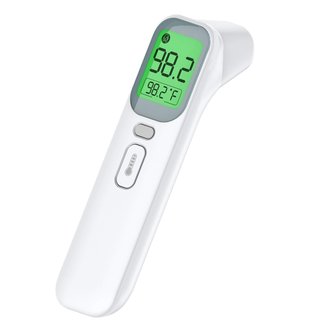“The most surprising finding
to me was that two-thirds of the patients who were seriously ill with
an active infection did not have a fever.” (Karina Davidson, PhD.)
###
When Davidson and her colleagues examined the health records of 5,700 patients who had been hospitalized for Covid-19 in New York State between March 1 and April 4, they found—to their surprise, apparently—that “the sickest patients didn’t present with a fever.” The study, published in the peer-reviewed Journal of the American Medical Association, was one of the first to challenge the accepted wisdom that Covid-19 invariably causes a fever.

No-touch temporal artery thermometer on Amazon. $34. My advice: don’t bother.
Which brings us to those handy-dandy forehead thermometers, which are becoming ubiquitous—in airport terminals, doctors’ offices, beauty salons, restaurants and bars. You get cleared by one of these and you’re good to go, right? No Covid, nothing to worry about. As a local bar owner posted on Facebook last week (he wants to open his place to karaoke, despite the fact that state guidelines currently prohibit live performances), “Step 1 is to keep COVID out in the 1st place, for that we have a forehead temp gun with an impossible to misunderstand Smily Face/Frowny Face and a light on top that either flashes Green or Red when you scan someone.” Sounds great, why bother with all that complicated and time-consuming testing for viruses (to know if you have an infection) or antibodies (to know if you’ve been infected in the past)?
Because having a fever is a poor predictor of being infected with Covid.
According to the U.K. Medicines and Healthcare Products Regulatory Agency, “thermal cameras and other such ‘temperature screening’ products, some of which make direct claims to screen for COVID-19, are not a reliable way to detect if people have the virus.” For all sorts of reasons:
- The main one (according to that New York study) is that two-thirds of potential Covid “Typhoid Marys” don’t have a fever.
- If you’re feeling a bit under the weather, you might pop a couple of Advil or Tylenol—thus reducing any fever you might have. (Technically, they’re antipyretics.)
- Any screening, not just checking foreheads for fever, inevitably comes with false negatives (missing illness) and false positives (finding a problem where none exists).
- Infrared screening thermometers measure forehead skin temperature, which isn’t a great indicator of core temperature (which is what you really want to know). Also, the reading can be affected by glasses and cosmetics.
- Even if you do get Covid-19 and it does cause a fever, it won’t show up for several days after infection, during which time you’re infectious. That symptom-free incubation phase can be anywhere between 2 and 14 days.
The proof is in real-world testing. The CNN Health site reported, back in mid-February, “While the US Centers for Disease Control and Prevention has screened more than 30,000 passengers in the past month, not a single US coronavirus case has been caught by airport temperature checks…” In a follow-up article, researchers Margaret McCartney and Carl Heneghan wrote, “The current vogue for use of these machines lends more to marketing than medical evidence.”
My real concern with IR thermometers is their potential to give a false sense of reassurance, even as Humboldt’s actual positive cases—per antibody and viral tests—are on the rise again (8.24 % increase in cases from previous week, as of last Thursday). If you’re still skeptical, take a look at the Humboldt County COVID-19 Dashboard, where you can see that only 17% of people who tested positive had a fever.
One more time, for your own sake (you don’t have to be altruistic about this!): mask up if you’re inside with other people, and outside if you’re talking in someone’s face. Masks—even cloth ones—reduce your viral load, which may be critical in not getting really sick*.
But forehead temperature testing? Fuhgeddaboudit.
- Here’s a good ten-minute summary of three lines of evidence for this from a viral infection expert—and how we might get to herd-immunity through small doses. For an opposing point of view, here’s this.
CLICK TO MANAGE